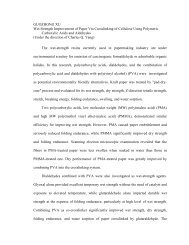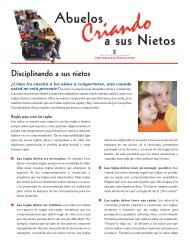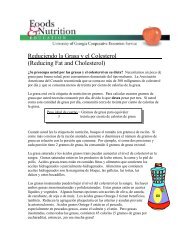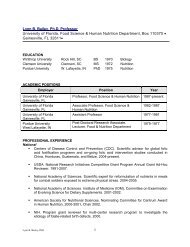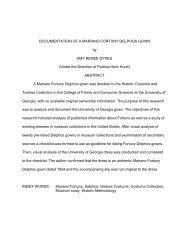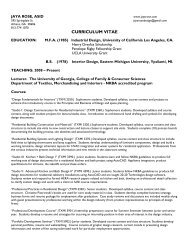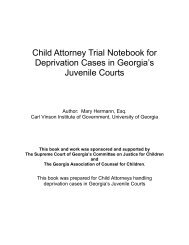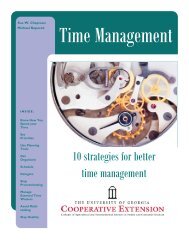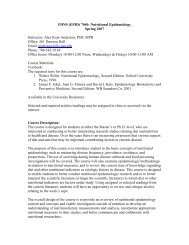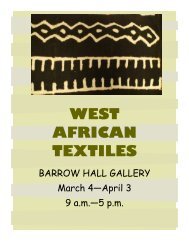G.I.C.H. - University of Georgia
G.I.C.H. - University of Georgia
G.I.C.H. - University of Georgia
Create successful ePaper yourself
Turn your PDF publications into a flip-book with our unique Google optimized e-Paper software.
After beginning her classes, Hardgrove<br />
began “poking around” the UGA library,<br />
looking for research that focused on the lives <strong>of</strong><br />
refugees.<br />
“There’s been a lot <strong>of</strong> work on PTSD<br />
(posttraumatic stress disorder) among refugees<br />
and a lot <strong>of</strong> anthropological and ethnographic<br />
research,” she says, “but I couldn’t find<br />
anything about the lived experiences <strong>of</strong> refugees<br />
day in and day out and what are their thoughts<br />
about who they are since they’ve become<br />
refugees.”<br />
With the support <strong>of</strong> her major pr<strong>of</strong>essor,<br />
Lynda Walters, Hardgrove began planning a<br />
research project to address those questions.<br />
A major hurdle was identifying a camp<br />
for her research. Not only is safety a concern,<br />
refugee camps are frequently known as havens<br />
for rebel groups, but Hardgrove also needed<br />
support in identifying refugees to interview for<br />
her project.<br />
She discovered Buduburam while researching camps on<br />
the United Nations website. Established 17 years ago to house<br />
those escaping the civil strife in Liberia, it housed 40,000<br />
refugees at its peak. The recent calming <strong>of</strong> tensions in Liberia,<br />
however, has reduced Buduburam’s population to around<br />
25,000.<br />
At Walters’ suggestion, Hardgrove looked for UGAsponsored<br />
study abroad programs to countries with refugee<br />
camps. She soon discovered that not only did UGA sponsor<br />
a study abroad program in Ghana, but co-director Alex<br />
Anderson, a FACS foods and nutrition faculty member, was<br />
very familiar with Buduburam—it’s located just down the road<br />
from where he attended high school in Ghana.<br />
Anderson put Hardgrove in touch with the Rev. Jerry<br />
Kandea, who is both a refugee and a Methodist minister<br />
living in Buduburam. Kandea helped Hardgrove find people<br />
to interview and also provided her a place to stay during the<br />
nearly two weeks she was in the camp. To further defray the<br />
expenses <strong>of</strong> the project, Hardgrove received the Sharon Y.<br />
Nickols International Study Award.<br />
Hardgrove began her research by talking with groups <strong>of</strong><br />
refugee women and children.<br />
“The focus groups gave me the opportunity to get a<br />
general sense <strong>of</strong> how things are and to test my questions,” she<br />
says. “The focus groups were a little more casual and there<br />
was more collective story telling that occurred. The individual<br />
interviews that I conducted later were more personal and could<br />
feel slow at times. I think I was asking them to think about<br />
things they had never thought about.”<br />
Among the children she interviewed, Hardgrove found<br />
an acceptance <strong>of</strong> life in Buduburam. After all, most <strong>of</strong> these<br />
young people were born in the camp. It’s the only life they<br />
know.<br />
But for their parents, life is hard and they don’t see that<br />
ever changing.<br />
“I think every single person told me, ‘I have to pay for<br />
water; I have to pay to use the toilet,’” Hardgrove says.<br />
Few <strong>of</strong> the adults have a regular source <strong>of</strong> income. Instead<br />
they “go around,” Hardgrove says, looking for work each<br />
day. However, there are the occasional entrepreneurs, like the<br />
woman who has obtained a freezer and makes ice to sell to her<br />
neighbors.<br />
Hardgrove says few <strong>of</strong> those she interviewed have any<br />
hope <strong>of</strong> returning to their homes in Liberia.<br />
“They may be afraid to go back or they may not see a way<br />
to go back,” she says. “For many <strong>of</strong> them, there’s nothing left<br />
for them in Liberia.”<br />
Despite the daily hardships and lack <strong>of</strong> opportunities they<br />
face, Hardgrove says the people she interviewed remained<br />
continued on page 28<br />
F A C S . S P R I N G . 2 0 0 8 9



